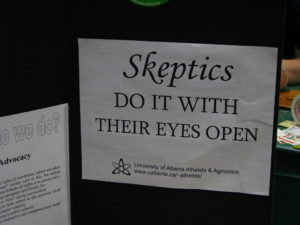Skeptic Magazine is a magazine published by the Skeptics Society, an organization devoted to promoting scientific skepticism and resisting the spread of pseudoscience, superstition, and irrational beliefs. It was first published in the spring of 1992 and has a circulation of 50,000. It’s available by subscription or on major newsstands in the U.S. and Canada as well as Europe, Australia, and other foreign countries. Michael Shermer, Skeptics Society’s founder is the Publisher and Editor-in-Chief of the magazine. Members of its editorial board include Richard Dawkins, Jared Diamond, James “The Amazing” Randi and Julia Sweeney. (Wikipedia).
In addition to the printed paper version, there is also the eSkeptic, an abridged version available on-line with a fairly extensive back-searchable archive. It reproduces some of the paper Skeptic and also has occasional exclusives.
Throughout its existence Skeptic has tirelessly dealt with a flood of unreason that at times seems to threaten the rational discourse and inquiry in both science and social life. According to their web page, “the Society engages in scientific investigation and journalistic research to investigate claims made by scientists, historians, and controversial figures on a wide range of subjects.”
Magazine’s favorite subjects varied throughout its history, and often pick up on very current, topical news and magazines’ stories, as well as more general Zeitgeist. but mainstays include debunking of pseudo-science (especially all kinds of PSI claims), UFO, yeti, mystical powers and vast knowledge of the ancient cultures (e.g. the whole pyramidology caboodle), supposed scientific hoaxes, faith healers, conspiracy theories, pseudo-historical claims (e.g. Holocaust denial) and moral panics and hysterias.
Current (and to my own mind, utterly bizarre) re-emergence of creationism in the form of so-called Intelligent Design (and more to the point, attempts to influence the educational systems as to have creationism treated as a competing scientific theory to evolution) is one of the recurring topic in the magazine. It also deals with evolutionary psychology – rather well, I have to say.
 Most issues concentrate around the cover story, be it global warming, medical controversies, religion, UFOs and similar. Unsurprisingly given that Skeptic is a US-based magazine, it also has a distinctly US focus, both in its coverage and in the issues it picks for analysis.
Most issues concentrate around the cover story, be it global warming, medical controversies, religion, UFOs and similar. Unsurprisingly given that Skeptic is a US-based magazine, it also has a distinctly US focus, both in its coverage and in the issues it picks for analysis.
Generally, the subjects of Skeptic’s interest cover a very wide area from downright loony (aliens and pyramidology) to trivial but quirky (Yeti) to entertainingly enlightening (optical illusions, brain quirks) to hugely important social and/or scientific issues (global warming, the creationist onslaught on evolution theory).
Most recent issues of Skeptic
To give you a few examples, subjects covered in the most recent issues of Skeptic include: How Likely is it that Human-level Intelligence will Evolve Again, The Myth of the Stages of Loss, Death and Grief, Near Death Experiences, Criminal Profiling, How We Know Global Warming is Real, A Reconstruction of Houdini’s Famous Show Exposing Sance Fraud, The Great Afterlife Debate: Michael Shermer versus Deepak Chopra, and reviews of books ranging from clear debunkers (e.g. Snake Oil Science: The Truth About Complementary and Alternative Medicine by R.Barker Bausell) to almost-frothy popular science (A Mind of its Own: How Your Brain Distorts and Deceives by Cordelia Fine).
As you can see, the controversy surrounding the subjects can also be of varying degrees: from ideas nobody but the most deluded, faithful and obsessed take seriously (alien abductions though as surveys claim that almost 50% of Americans believe UFOs are real, maybe even that is not as much of a minority pursuit as it seems to me…) to those that are believed by many but have no support whatsoever from so-called scientific community (crystal healing) to those that are framed as controversial while being pretty clear (creationism, sorry, Intelligent design) to genuinely undecided, controversial and currently-being-discussed (if not necessarily mainstream) like validity of climate models underlying global warming panic.
Breaking from Skeptic
I had a break from Skeptic for a while and have happily found out that in recent years it devoted quite a bit of space to debunking current health obsessions: from faddist “healthy” eating advice and unnecessary supplements to “alternative” medicine (ear candles, anybody?) and unnecessary medical screenings.
I also like their book review section very much, where a wide selection material from the area of popular science is insightfully reviewed.
 “Skeptic’s” approach is lively and polemical but by no means rabid. In fact, it’s civilized, measured and intellectually honest. I suppose this is what you need fighting for the cause as fraught with heated polemics as theirs. The accusation of below-belt tactics abound in heated arguments concerning major tenents of beliefe in culture and society and thus one needs to be extra clean in the tactics to avoid such accusations.
“Skeptic’s” approach is lively and polemical but by no means rabid. In fact, it’s civilized, measured and intellectually honest. I suppose this is what you need fighting for the cause as fraught with heated polemics as theirs. The accusation of below-belt tactics abound in heated arguments concerning major tenents of beliefe in culture and society and thus one needs to be extra clean in the tactics to avoid such accusations.
And thus, for example, “Skeptic” reports manipulations, falsities and myths coming from the anti-creationist side of the divide as honestly as the creationist ones. Their debunking and polemic articles are invariably well researched, and quote numerous references that can be checked on for details.
Although “Skeptic” certainly leans towards agnosticism if not outright atheism, it’s not completely anti-religious. Its modus operandi is informed by looking for natural explanations for phenomena, or, to quote its editor, “Before we say something is out of this world, we must first make sure it is not in this world.”
It is, however, a vehement supporter of secularism in the public sphere and separation of Church and state. In this and many other cases, one couldn’t say that “Skeptic” presents arguments susceptible to the rational inquiry without taking sides, but it’s rarely if ever vicious in its side-taking (my other favorite and the controversial magazine is UK-based Spiked! On-line, with a far bigger mouth and correspondingly more entertaining).
Important Controversies of our Time
The skeptic is certainly an interesting magazine which deals with many of the important controversies (or pseudo-controversies) of our time in a balanced, well researched and often entertaining manner. It’s clear-headed but not cynical approach strikes the right balance between having fun debunking the most outrageous examples of irrationality and considered the analysis of the truly controversial ideas. The editors and authors of the Skeptic seem genuinely committed to applying the same rules of skeptical inquiry to “their side” as they would to the ideas they are critical of.
Where “Skeptic” fails for me is in its fairly unbridled support of the social and economic status quo of the capitalist United States. They support science when it comes to creationism and faith healers, but they don’t seem to apply that skeptical thinking to the social world. There was a waft of hope with Shermer’s criticism of the idea of homo economicus making rational choices in free markets (which is the basis of neo-classical economic orthodoxy and thus criticism of that can be implicitly taken as a criticism of the theory itself). But too often the scientific theories “Skeptic” defends are put in the service of propping up (and justifying) something close to laissez-faire capitalism. While the eyes of “Skeptic” remain very open on the lookout for pseudo-scientific and downright loony claims, they become strangely blinkered when for example claiming the so-called “liberal bias” in American Academia and media (which is, on the whole, as far right as it’s humanly possible without becoming outright Fascist).
Still, there are other sources for political enlightenment. Anybody interested in genuine intellectual honesty and in furthering the cause of human reason would find Skeptic Magazine interesting and valuable read.
Highly recommended, and by no means just for atheists.






